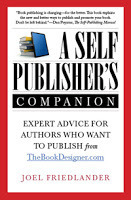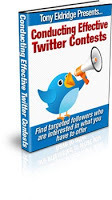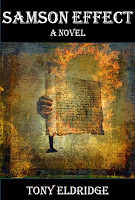Brainstorming Non-bookstore Sales By Joel Friedlander
 Today, I'm thrilled to introduce you to a top expert in the indie publishing world, Joel Friedlander. Joel is the creator of the The Book Designer blog and he has a new book out, A Self-Publisher's Companion: Expert Advice for Authors Who Want to Publish, that will no-doubt be a staple resource for all indie authors. Today, Joel will share his ideas on why and how authors should consider non-bookstore sales.
Today, I'm thrilled to introduce you to a top expert in the indie publishing world, Joel Friedlander. Joel is the creator of the The Book Designer blog and he has a new book out, A Self-Publisher's Companion: Expert Advice for Authors Who Want to Publish, that will no-doubt be a staple resource for all indie authors. Today, Joel will share his ideas on why and how authors should consider non-bookstore sales.Before we get to Joel's post, I have one quick in-house announcement. I will be announcing a new Twitter contest next month with prizes from book marketing experts from all over the world. Already, I have some great prizes lined up. Tomorrow is the last day that my Call For Sponsors is open. If you have a book marketing prize you want to make available for the contests, visit my post, New Spring Twitter Contest: Call For Sponsors and fill out the form on the post. I will get back with everyone who submits a prize within a week with details on the contest.
Now, on to Joel's post...
Brainstorming Non-bookstore Sales
Joel Friedlander
When it comes to book marketing there's an old saying that the worst place to sell indie-published books is in a bookstore.
Why? Bookstore distribution is set up to work for large publishers with a national reach, an on-the-field sales force, national advertising and the ability to place a book in thousands of bookstores at launch.
This is a bad match for most indie authors and self-publishers, who don't have the distribution, the sales force, the staff to monitor and track shipments and invoices, and who could be severely affected by massive returns if their books don't sell through in the time the bookstores will give them on the shelf.
We already know that a really great way to sell our books is online, through online book retailers like Amazon, BN.com and others. And for e-book publishers, the online world is just about the only world for book sales.
But there are many other ways for self-publishers to sell their books, particularly nonfiction authors. Generally we call all these non-bookstores sales "special sales" and they can be a godsend for a small publisher.
Advantages of Special Sales Channels
Here are some of the advantages of making special sales to augment your other sales efforts. While some of these points require a book that's offset printed, others can be handled by print runs at digital, print on demand suppliers, too.
Books sold to non-bookstore buyers are not returnable.
By extending your print run, a special sale will reduce the cost of your own books, since the unit cost will go down as the quantity ordered goes up.
Special sales will require payment on delivery, usually at 50% of retail. This can help pay your printing costs.
If you agree to print books with the buyer's branding, like for a corporate sale, you'll get the benefit of associating with a larger company or foundation.
A partner's access to your potential buyers can help you to grow your own list for direct marketing.
How are you going to find these opportunities? This is where the brainstorming comes in. Part of this process borrows from demographics, in which we try to model the typical buyer of your book and then use that information to find other likely book buyers.
Finding Opportunities for Special Sales
As an example, let's say you have a book about family bicycling adventures in northern California.
Your brainstorming would start with looking at who would buy your book, and then going deeper into who those people are, where they buy, and where they hang out. Here are some ideas.
--Think about where they buy their bicycling gear. Bike stores sell lots of books, and that would be the first opportunity you could look at.
--But what about larger outdoor equipment retailers? Stores like REI have substantial book departments and would likely be interested in your book.
--Visitors centers at many parks carry books related to activities you can pursue nearby. This would be a natural throughout the area your book covers.
--Families who cycle together are likely to also camp together, since they are closely related activities. Camping supply stores, whether they sell bike gear or not, would be another venue for your book.
--Tie-ins represent lots of opportunities. For instance, a company that sells kid trailers that you pull with your bike might be interested in making a bulk purchase of your book and using it as a giveaway or premium for their own sales efforts.
--You could also tie-in with a travel planning company that specializes in family adventure trips in the area your book covers.
--Corporations looking to encourage employees to get healthy could use your book as an incentive in their wellness program, and might buy a large quantity of books printed with their own corporate logo on them.
--We're obviously dealing with a family with small children. Perhaps there's a local chain of children's clothing stores that would like the book on their counter, or branded as a premium?
If some of these ideas remind you of long-tail marketing, there's a good reason for that. We're drilling down into the demographic to find affiliations in this group.
Finding groups of your target buyers will lead to all kinds of sales opportunities where you're free, outside the confines of book distribution, to negotiate sales to your benefit with your book as your product.
------
 Joel Friedlander
is the proprietor of Marin Bookworks in San Rafael, California, a publishing services company where he's helped launch many self-publishers. He blogs about book design, writing and self-publishing at www.TheBookDesigner.com. Joel is also the author of the newly-published A Self-Publisher's Companion: Expert Advice for Authors Who Want to Publish.
Joel Friedlander
is the proprietor of Marin Bookworks in San Rafael, California, a publishing services company where he's helped launch many self-publishers. He blogs about book design, writing and self-publishing at www.TheBookDesigner.com. Joel is also the author of the newly-published A Self-Publisher's Companion: Expert Advice for Authors Who Want to Publish.--------
Tony Eldridge is the author of The Samson Effect , an action/adventure novel that Clive Cussler calls a "first rate thriller brimming with intrigue and adventure." He is also the author of the Twitter marketing book, Conducting Effective Twitter Contests .










Published on March 31, 2011 04:00
No comments have been added yet.





